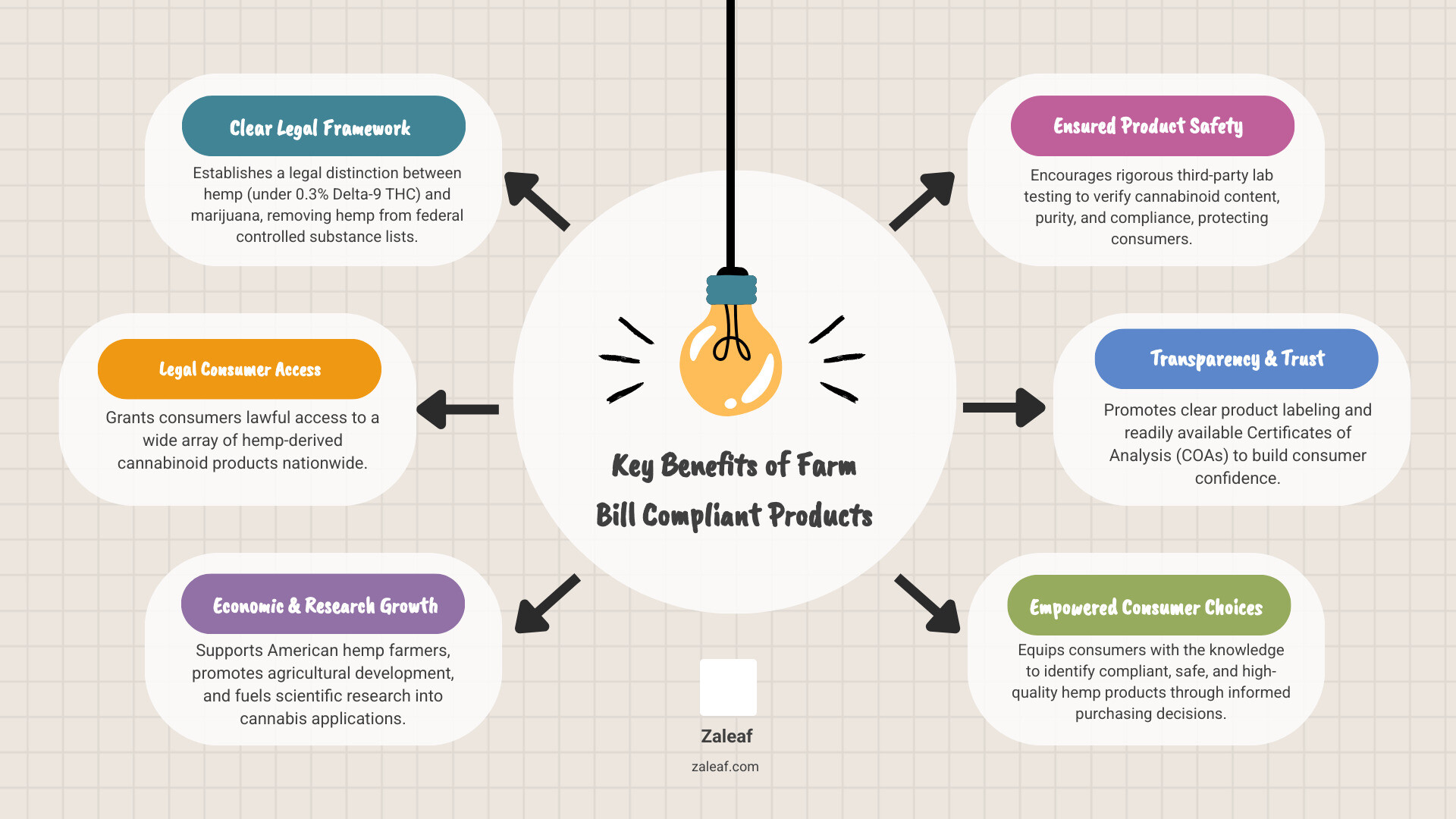The Farm Bill Explained: Your Guide to Hemp Legality
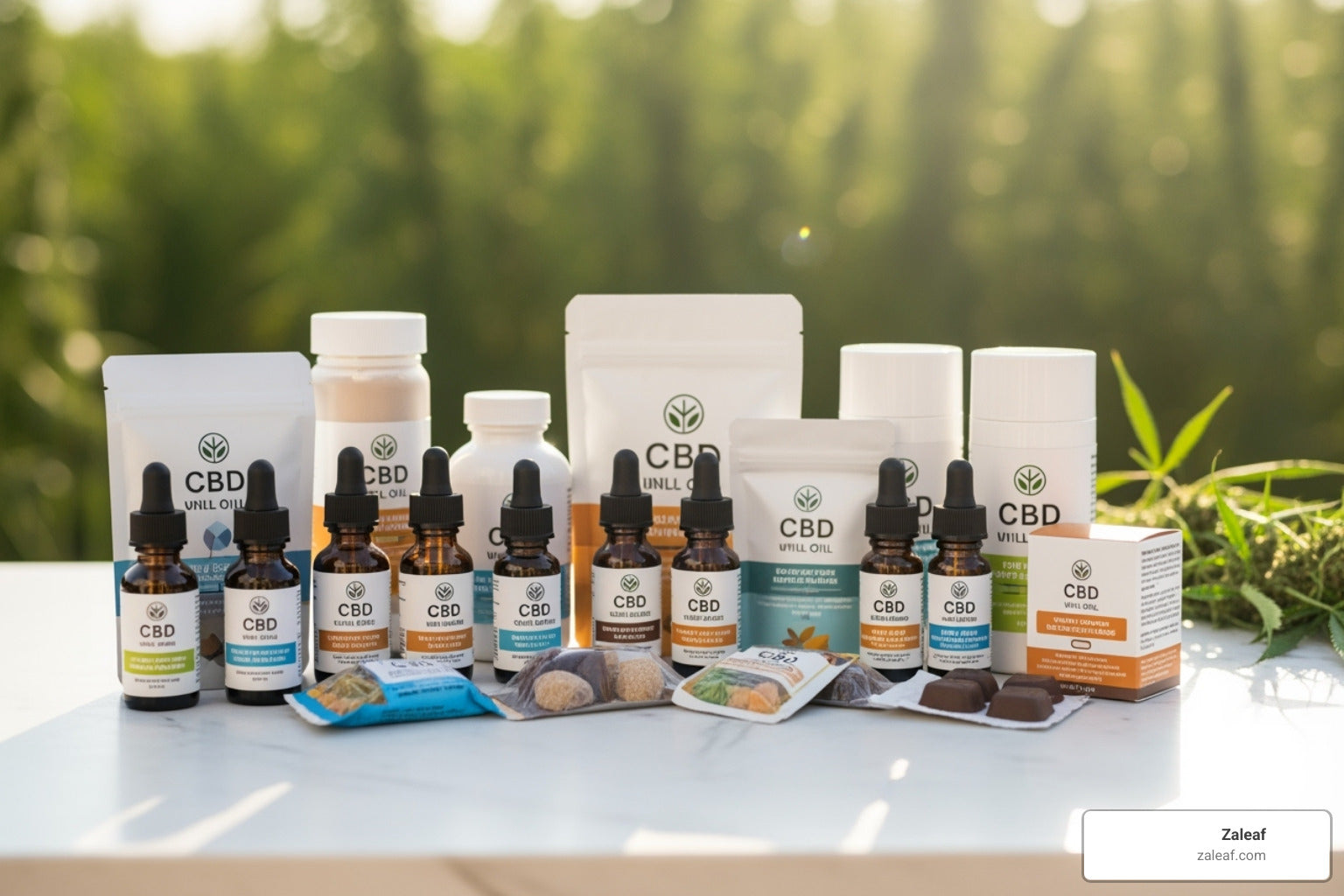
Understanding Farm Bill Compliance: The Key to Legal Hemp Products
Farm Bill compliant products are hemp-derived items that contain no more than 0.3% Delta-9 THC on a dry weight basis, making them federally legal under the Agriculture Improvement Act of 2018. Here's what makes a product Farm Bill compliant:
- Hemp-derived source: Must come from legally cultivated hemp plants
- THC limit: Contains less than 0.3% Delta-9 THC by dry weight
- Third-party tested: Verified through Certificate of Analysis (COA)
- Licensed cultivation: Grown by USDA-approved or state-licensed farmers
- Proper labeling: Clear indication of compliance and cannabinoid content
The 2018 Farm Bill revolutionized the cannabis industry by removing hemp from the Controlled Substances Act, creating a legal pathway for millions of Americans to access cannabinoid products without visiting dispensaries or obtaining medical cards. This landmark legislation distinguishes between hemp (containing ≤0.3% Delta-9 THC) and marijuana (containing >0.3% Delta-9 THC), establishing the foundation for today's thriving hemp market.
However, navigating Farm Bill compliant products can be confusing. While the federal government legalized hemp-derived cannabinoids, the FDA maintains strict regulations on how these products can be marketed, and individual states have implemented their own restrictions. Understanding these nuances is crucial for consumers who want legal, safe, and effective hemp products.
As Max Shemesh, CEO of Zaleaf, I've guided our company through the complex landscape of Farm Bill compliant product development, ensuring every item meets federal standards while delivering the quality our customers expect. My experience scaling Zaleaf across 10+ markets has taught me that compliance isn't just about legality—it's about building trust with consumers who deserve transparency and consistency.
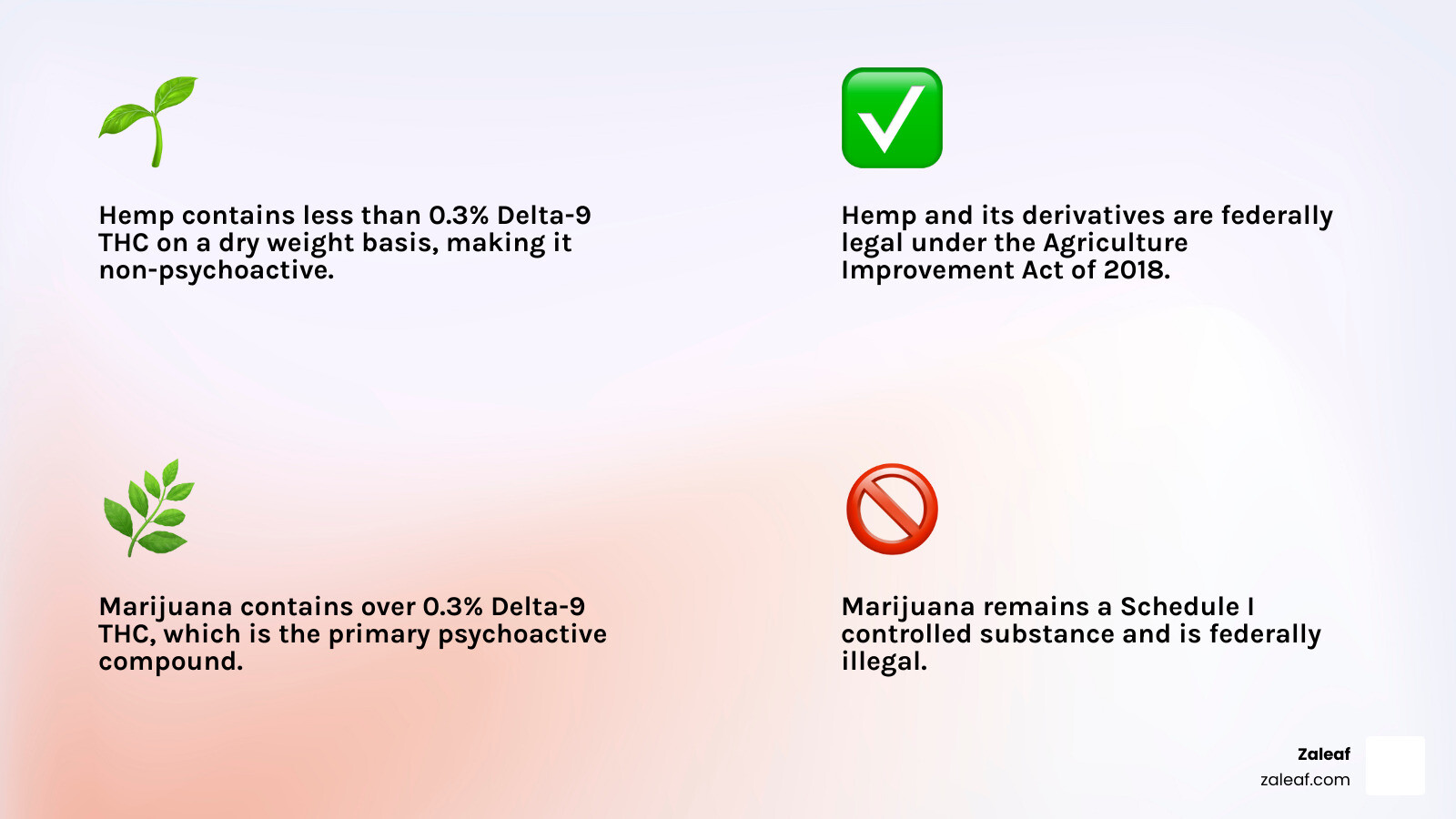
What Makes a Product "Farm Bill Compliant"?
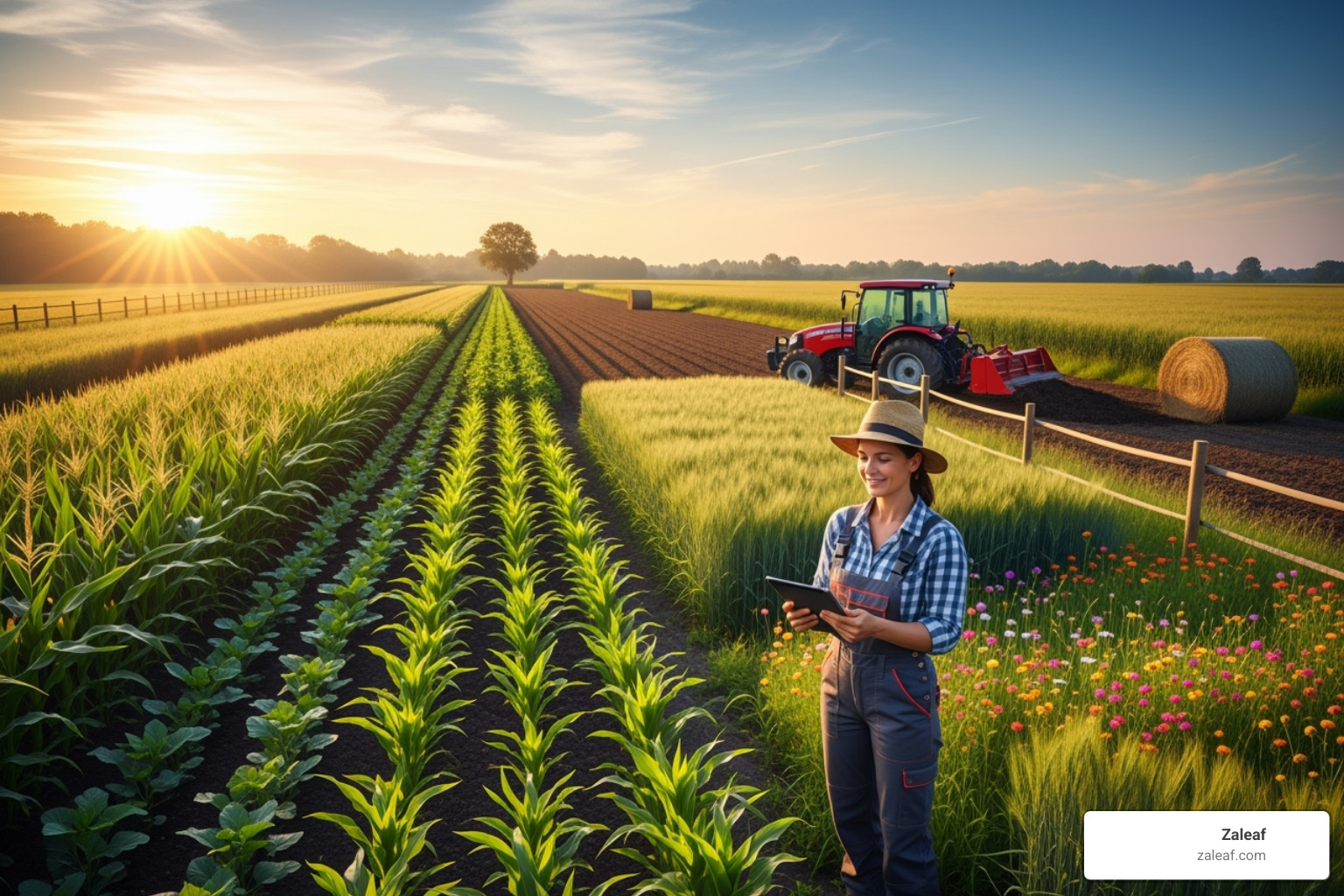
Picture this: before 2018, buying hemp products was like trying to buy something that didn't officially exist. Hemp was lumped together with marijuana under the Controlled Substances Act, making it federally illegal across the board. Then came the Agriculture Improvement Act of 2018—better known as the 2018 Farm Bill—and everything changed.
This groundbreaking legislation didn't just tweak existing laws; it completely redrew the legal map for cannabis in America. The Farm Bill created a clear, measurable distinction between hemp and marijuana, giving hemp its own legal identity for the first time in decades.
The magic number? 0.3% Delta-9 THC on a dry weight basis.
Here's where it gets interesting. The Farm Bill defines hemp as the cannabis plant and any part of that plant—including seeds, derivatives, extracts, cannabinoids, isomers, acids, salts, and salts of isomers—containing no more than 0.3% Delta-9 THC by dry weight. Cross that threshold, even by a tiny fraction, and your product legally becomes marijuana, which remains a Schedule I controlled substance under federal law.
Why exactly 0.3%? It's the government's way of drawing a bright line between industrial hemp (grown for fiber, seeds, and non-intoxicating compounds) and marijuana (cultivated specifically for its psychoactive effects). This seemingly small percentage makes all the difference between a Farm Bill compliant product you can order online and something that would require a trip to a licensed dispensary.
For a product to earn that coveted "Farm Bill compliant" label, it must tick several important boxes. The hemp must be legally cultivated by USDA-approved or state-licensed farmers. The final product must stay under that 0.3% Delta-9 THC limit when measured on a dry weight basis. And crucially, this compliance must be verified through third-party lab testing that consumers can actually see and verify.
At Zaleaf, we've built our entire business around this framework. Every product we offer meets these federal standards, which is why our customers can shop with confidence—no medical card required, no dispensary visits needed, just legal hemp products delivered right to your door.
The 2018 Farm Bill essentially gave hemp a new lease on life, treating it like any other agricultural commodity. Farmers could finally grow it legally, businesses could process it, and consumers could access it. You can explore the full details of this game-changing legislation in The 2018 Farm Bill text.
This legal foundation has opened doors for millions of Americans who want to explore cannabinoids without navigating state-specific marijuana laws. It's created a thriving industry built on transparency, testing, and that all-important 0.3% threshold that keeps everything above board.
The Legal Maze of Cannabinoids: From CBD to Delta-8
The 2018 Farm Bill didn't just open the door for CBD—it releaseed a whole universe of cannabinoids, each with its own personality and legal quirks. Think of it like this: the Farm Bill gave hemp the green light, but then the FDA stepped in as the strict parent, setting rules about what you can actually do with these newly legal compounds.
Here's where things get interesting (and admittedly a bit confusing). While the Farm Bill removed hemp from the scary list of controlled substances, it specifically said the FDA still gets to be the boss when it comes to products people actually consume. So even if your product comes from perfectly legal, Farm Bill compliant hemp, it still needs to play by FDA rules—especially when companies start making bold health claims.
The real challenge comes from the fact that federal law, state law, and FDA regulations don't always sing in harmony. What's federally legal might face restrictions in your state, or what seems obviously safe might still be in regulatory limbo with the FDA. It's like trying to steer a maze where the walls keep moving.
At Zaleaf, we've made it our mission to cut through this confusion. We believe you shouldn't need a law degree just to understand whether your hemp products are legal and safe.
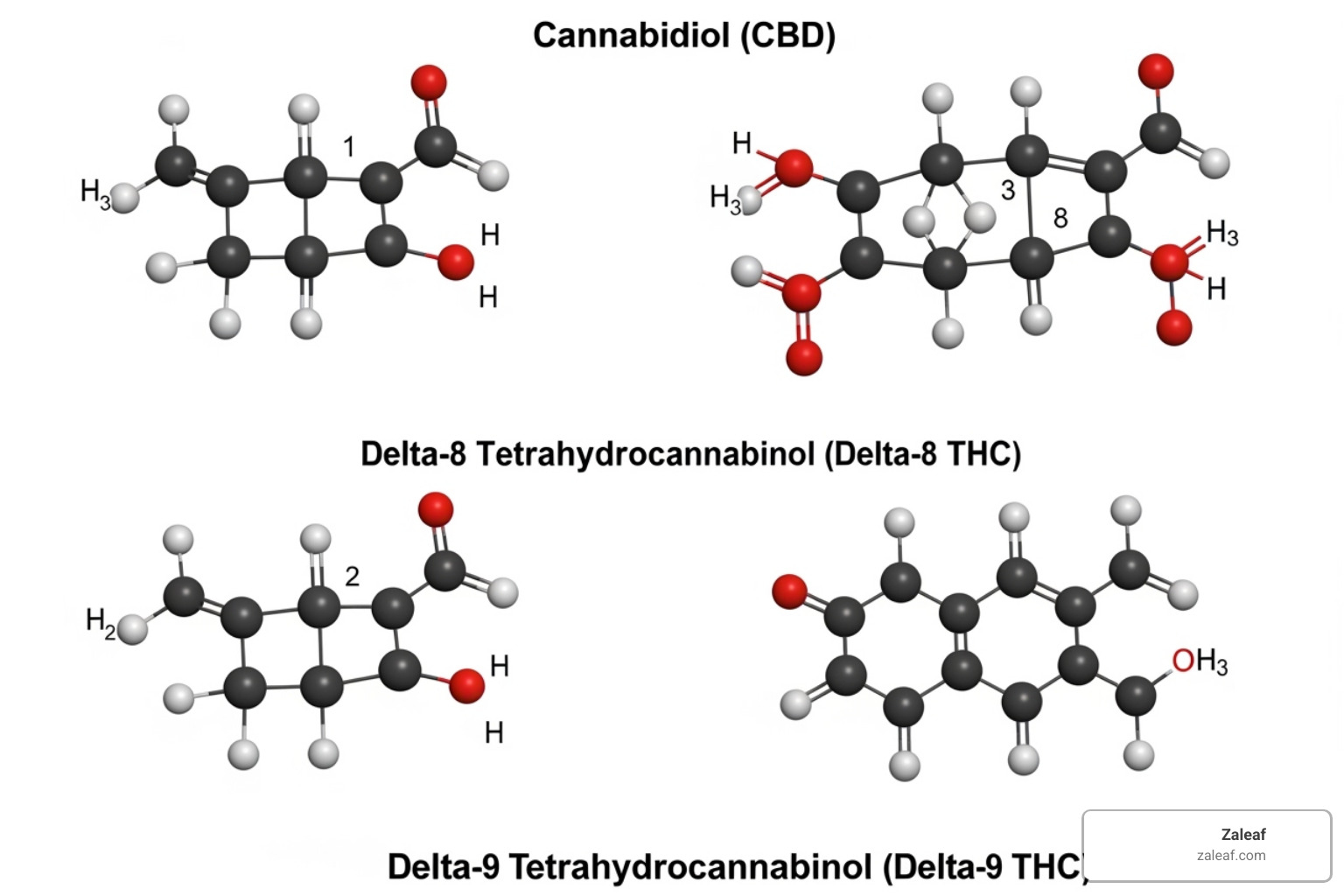
Is CBD Legal? Understanding the FDA's Position
If you've ever wondered whether CBD is actually legal, you're asking one of the most common—and honestly, most frustrating—questions in the hemp world. The short answer is: it's complicated. The longer answer requires understanding how the FDA thinks about CBD.
The FDA has a pretty clear stance: they see huge potential in cannabis-derived compounds, but they want rigorous testing before these compounds hit the market as medicines. They've actually approved a purified CBD medication for treating severe epilepsy, along with a few synthetic THC drugs. This proves they're not anti-cannabis—they just want proper scientific backing.
But here's where it gets tricky. The FDA has decided that CBD cannot legally be added to food or sold as a dietary supplement in interstate commerce. Their reasoning? Since CBD has been investigated as a new drug and is an active ingredient in approved medications, it's excluded from the dietary supplement definition.
This creates an odd situation where CBD derived from Farm Bill compliant hemp is federally legal, but the FDA restricts how it can be used and marketed. That's why you'll see products carefully labeled as "hemp extracts" rather than "CBD supplements"—companies are navigating these regulatory waters.
The FDA continues to monitor the market closely, sending warning letters to companies making unsubstantiated health claims. They're also tracking adverse event reports to ensure consumer safety. Interestingly, they've given the green light to hulled hemp seeds, hemp seed protein powder, and hemp seed oil for food use, since these don't naturally contain THC or CBD.
For a deeper dive into the FDA's official position, check out their FDA's Q&A on Cannabis Products.
The "Legal Loophole": How Delta-8 and THCA Products are Farm Bill Compliant
Here's where the hemp industry got creative. The 2018 Farm Bill was very specific about restricting Delta-9 THC to 0.3%, but it didn't mention other intoxicating cannabinoids. This precision in legal language created what many call a "legal loophole"—and it's given birth to an entire market of psychoactive hemp products.
Delta-8 THC is the star of this show. While it occurs naturally in hemp plants (just in tiny amounts), clever chemists figured out how to convert CBD into Delta-8 through a process called isomerization. Since Delta-8 isn't Delta-9, and the Farm Bill only restricts Delta-9 THC, these products remain Farm Bill compliant. Delta-8 offers a gentler, more clear-headed high than traditional Delta-9 THC, with many users reporting less anxiety and paranoia.
THCA flower represents another fascinating workaround. THCA is the non-intoxicating precursor to Delta-9 THC—it only becomes psychoactive when you heat it up (like when smoking or vaping). Since the Farm Bill measures Delta-9 THC content before any heating occurs, hemp flower can be naturally high in THCA while still testing below 0.3% Delta-9 THC. When consumed, it delivers the same effects as traditional cannabis.
The math gets even more interesting with edibles and beverages. Because the 0.3% limit is calculated by dry weight, a heavy gummy can contain several milligrams of Delta-9 THC while staying well under the percentage threshold. A 4-gram gummy with 10mg of THC is only 0.25% THC by weight—perfectly legal and definitely effective.
These interpretations have sparked heated debates. Critics argue they circumvent the Farm Bill's intent, while supporters say they're simply following the law as written. Until federal legislation gets updated, these products remain a legal pathway to cannabinoid experiences beyond CBD.
At Zaleaf, we ensure all our products strictly adhere to the 0.3% Delta-9 THC limit, giving you legal access to these innovative compounds while maintaining full compliance.
How to Verify a Truly Farm Bill Compliant Product
With so many hemp products flooding the market, knowing how to spot a truly Farm Bill compliant product isn't just about staying legal—it's about protecting your health and getting what you actually paid for. The good news is that verifying compliance is easier than you might think, once you know what to look for.
Third-party lab testing is your best friend here. Every reputable brand provides a Certificate of Analysis (COA) for each product batch, showing exactly what's inside. These lab reports should confirm the Delta-9 THC level stays below 0.3%, verify other cannabinoid concentrations, and screen for nasty stuff like pesticides, heavy metals, and harmful bacteria.
Look for QR codes on product packaging—scanning these should instantly pull up the lab results for that specific batch. At Zaleaf, we make this process seamless by partnering with ISO 17025 certified labs, ensuring our testing follows the highest industry standards.
Licensed cultivation matters too. Truly compliant products start with hemp grown by USDA-approved or state-licensed farmers. This ensures the raw material meets legal hemp definitions from day one. Our products come from organically grown American hemp, and we operate as a licensed manufacturer in Florida under strict GMP standards.
Finally, clear labeling tells the whole story. Legitimate products clearly state their Delta-9 THC content, total cannabinoids, and other relevant information. Be wary of vague labels or products that seem to hide their contents.
While some bad actors have tried to game the system with fake lab results, reputable companies invest in rigorous testing because it protects both you and their reputation. We put every product through full-panel testing for potency, terpenes, pesticides, heavy metals, solvents, mycotoxins, and microbials—because transparency isn't just good business, it's the right thing to do.
Beyond the Store Shelf: The Farm Bill's Broader Impact
When you pick up a Farm Bill compliant hemp product, you're holding more than just a bottle or gummy—you're holding a piece of American agricultural history. The 2018 Farm Bill didn't just change what we can buy; it transformed entire communities, opened doors for farmers, and releaseed decades of pent-up scientific curiosity about cannabis.
Think about it this way: the Farm Bill is like the Swiss Army knife of American agriculture. It's a massive piece of legislation that gets renewed roughly every five years, touching everything from the food on your dinner table to the conservation of our natural resources. When hemp got written into this agricultural playbook, it suddenly had access to the same support systems that have helped American farmers thrive for generations.
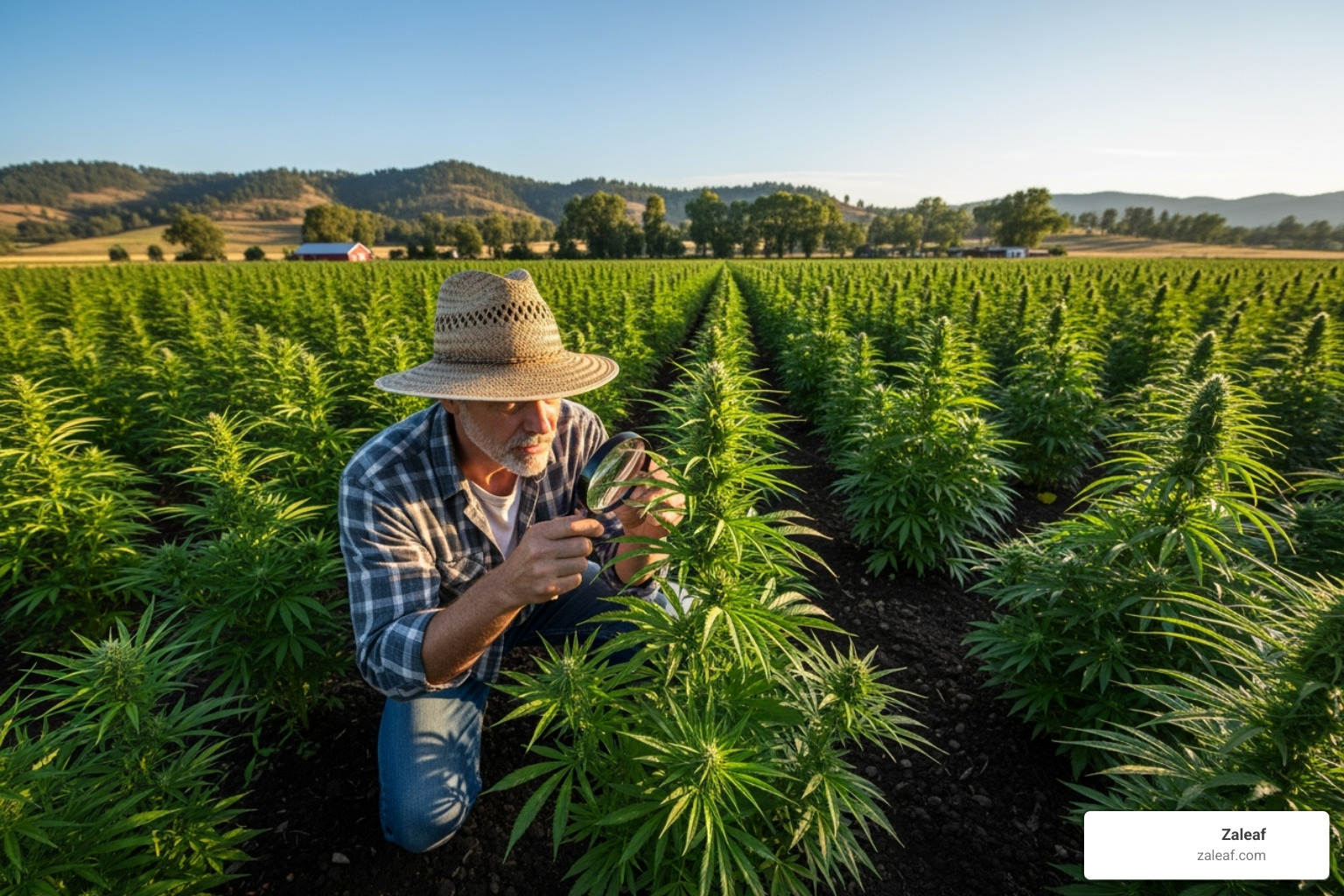
Support for America's Hemp Farmers
Picture a farmer in Kentucky who used to grow tobacco, watching that market shrink year after year. Then 2018 rolls around, and suddenly hemp becomes a legitimate agricultural commodity with real government backing. That's not just a career change—that's a lifeline for rural America.
The 2018 Farm Bill brought hemp farmers into the fold with programs that had been supporting traditional crops for decades. Now hemp growers can access crop insurance through the Federal Crop Insurance Act, protecting them when Mother Nature doesn't cooperate or markets take unexpected turns. If a hailstorm destroys their hemp crop, they're not left empty-handed like they would have been just a few years ago.
These farmers also gained access to USDA programs that help with everything from getting started to recovering from disasters. The USDA Disaster Assistance Tool becomes a real resource when floods or droughts threaten their livelihood. Farm loans through government programs make it possible for new hemp farmers to get the capital they need for land, equipment, and operations.
The numbers tell an impressive story. The 2018 Farm Bill was projected to cost about $428 billion over five years. While most of that goes to nutrition programs like food stamps, billions flow directly to farmers through conservation programs, research initiatives, and disaster relief. Hemp farmers now get their slice of this support system, helping stabilize an industry that's still finding its footing.
What's really exciting is how this support creates a ripple effect. Rural development programs funded by the Farm Bill help entire communities thrive as hemp farming brings new economic opportunities to areas that desperately needed them. It's not just about individual farmers—it's about revitalizing whole regions of America.
Fueling Cannabis Research and Innovation
For decades, studying cannabis was like trying to solve a puzzle with most of the pieces locked away. The Schedule I classification made it incredibly difficult for researchers to get their hands on cannabis for legitimate scientific study. Then the 2018 Farm Bill changed everything by removing hemp from the Controlled Substances Act.
Suddenly, researchers could study CBD, minor cannabinoids, and hemp-derived compounds without jumping through nearly as many regulatory hoops. This shift has been like opening the floodgates for scientific research that had been bottled up for decades. Universities, private companies, and government institutions can now explore questions that were practically impossible to investigate before.
The National Institute on Drug Abuse (NIDA) and other federal agencies are actively supporting this research boom. They're funding studies on everything from medical applications to understanding how different cannabinoids interact with our bodies. This isn't just academic curiosity—it's laying the groundwork for safer, more effective products that could help millions of people.
What does this mean for you as a consumer? Product development is advancing at lightning speed because companies can now base their formulations on solid science rather than guesswork. The research happening today is creating the Farm Bill compliant products of tomorrow, backed by real evidence about what works and why.
We're seeing breakthroughs in understanding how different cannabinoids work together, how terpenes influence effects, and how to optimize products for specific needs. This scientific foundation is what allows companies to create products with consistent, predictable effects rather than just hoping for the best.
The Research on the medical use of cannabis being conducted today will shape the industry for years to come. We're living through a renaissance of cannabis science, and every Farm Bill compliant product benefits from this expanding knowledge base.
It's honestly thrilling to be part of an industry that's finally getting the scientific attention it deserves. The farmers growing the hemp, the researchers studying the compounds, and the companies creating innovative products are all working together to open up the full potential of this remarkable plant.
Frequently Asked Questions about Farm Bill Compliance
Navigating hemp and cannabis legality can feel like trying to solve a puzzle with half the pieces missing. We get it—the laws are complex, and there's a lot of conflicting information out there. Let's clear up some of the most common questions we hear from customers about Farm Bill compliant products and what the legislation actually means for you.
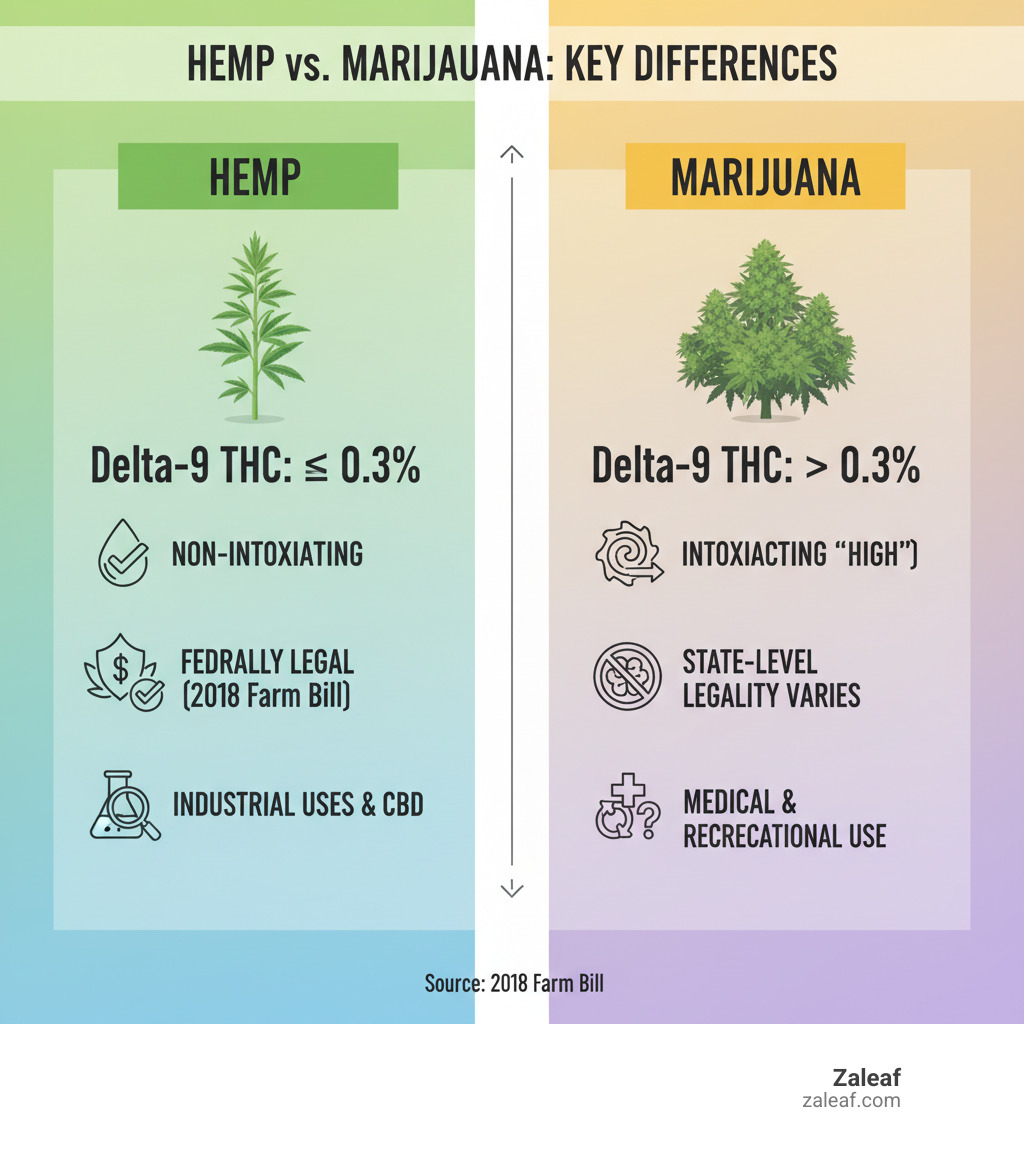
What is the legal difference between hemp and marijuana?
Here's the million-dollar question that trips up so many people. The answer is surprisingly simple, even though the implications are huge. Both hemp and marijuana come from the exact same plant species: Cannabis sativa L. They're botanical twins, but the law treats them like completely different creatures.
The only thing that separates legal hemp from illegal marijuana is one specific number: 0.3% Delta-9 THC on a dry weight basis. That's it. If your cannabis plant tests at 0.29% Delta-9 THC, congratulations—you've got legal hemp. If it hits 0.31%, you're now dealing with federally illegal marijuana.
This tiny difference has massive real-world consequences. Hemp won't get you high because that 0.3% threshold is far below what's needed for psychoactive effects. Most people need at least 2-5mg of THC to feel anything, and hemp products simply can't deliver those amounts while staying legal.
Marijuana, on the other hand, can contain 15%, 20%, or even 30% Delta-9 THC—that's 50 to 100 times more than hemp. This is why marijuana produces the classic cannabis "high" and remains a controlled substance, while hemp gets treated like any other agricultural crop.
Does the Farm Bill make state-legal cannabis programs federally legal?
This is probably our most frequently asked question, and the answer might disappoint some folks: absolutely not. The 2018 Farm Bill didn't touch marijuana's federal legal status, not even a little bit.
Think of it this way: the Farm Bill created a narrow legal pathway specifically for hemp—that low-THC cannabis we just talked about. It didn't build a bridge between state marijuana laws and federal law. Those two systems still exist in completely separate worlds.
So even if you live in California, Colorado, or any of the dozens of states with legal marijuana programs, those programs remain federally illegal. The Controlled Substances Act still classifies marijuana as a Schedule I drug, and the Farm Bill didn't change that. State-legal dispensaries, medical marijuana cards, recreational cannabis—all of that operates under state law while technically violating federal law.
The Farm Bill simply said, "Hey, if it's hemp (under 0.3% Delta-9 THC), it's no longer a controlled substance." That's a game-changer for Farm Bill compliant products, but it doesn't affect traditional marijuana in any way.
What is the current status of the Farm Bill?
Farm Bills don't last forever—they're designed to expire every five years or so, forcing Congress to revisit and update agricultural policy. The 2018 Farm Bill that legalized hemp was originally set to expire in 2023, which had a lot of people in the hemp industry holding their breath.
The good news? Congress passed the American Relief Act, 2025 on December 21, 2024, which extended the 2018 Farm Bill for one more year through September 30, 2025. This means all the programs and definitions that make Farm Bill compliant products legal are staying put for now.
This extension covers all the important stuff—the safety-net programs for farmers, conservation initiatives, and most importantly for us, the legal framework that defines hemp and keeps it separate from the controlled substances list. Programs like crop insurance for hemp farmers, disaster assistance, and research funding all continue under this extension.
While Congress continues working on a brand-new comprehensive Farm Bill, this extension gives everyone stability. Hemp farmers can keep planting, manufacturers can keep producing, and you can keep enjoying legal cannabinoid products without worrying about sudden legal changes.
The hemp industry has grown tremendously since 2018, and there's strong bipartisan support for keeping hemp legal in whatever new Farm Bill eventually emerges. So while we can't predict exactly what future legislation will look like, the foundation for legal hemp products appears solid.
Conclusion: Shop with Confidence in the Age of Legal Hemp
The journey through the intricacies of the Farm Bill and its impact on hemp legality might feel overwhelming at first, but we hope this guide has brought you the clarity you deserve. The 2018 Farm Bill was truly a watershed moment—it drew that crucial line between hemp and marijuana and opened doors to an incredible world of Farm Bill compliant products that were previously unimaginable.
This landmark legislation didn't just change paperwork; it transformed lives. It empowered American farmers to cultivate a versatile crop, sparked groundbreaking research into cannabinoids, and most importantly, gave you legal access to the diverse benefits of hemp-derived products. No more wondering if you're breaking the law or worrying about legal complications—Farm Bill compliant products offer peace of mind alongside their wellness benefits.
At Zaleaf, we've built our entire foundation on the principles that matter most to you: legality, safety, and transparency. Every single product we offer is 100% legal under federal law, carefully derived from Farm Bill compliant hemp that meets those strict 0.3% Delta-9 THC requirements. We don't cut corners when it comes to third-party lab testing—our rigorous testing process verifies cannabinoid content and screens for contaminants, giving you the confidence that what's on the label is exactly what's in the product.
What sets us apart is our commitment to enhancing cannabinoid and terpene profiles for mood-specific effects. Whether you're looking to unwind after a long day, boost your focus, or find your perfect balance, we've crafted products that deliver custom experiences. And here's the beautiful part—you can access all of this without needing an ID or medical card. The Farm Bill made legal hemp products accessible to everyone, and we're proud to honor that accessibility.
Quality and trust aren't just buzzwords for us—they're the foundation of everything we do. As you explore the exciting possibilities that legal hemp products offer, being an informed consumer is your superpower. Look for clear labeling that shows compliance, demand those third-party lab results, and choose brands that prioritize your safety and satisfaction above all else.
The age of legal hemp is here, and it's thriving. You no longer need to steer confusing state laws or worry about federal compliance when you choose products that meet Farm Bill standards. This is your invitation to experience the Zaleaf difference with complete confidence.
We invite you to find what Farm Bill compliant products can do for your wellness journey. Explore our full range of legal vapes and other products, knowing that each item is crafted with compliance, quality, and your well-being as our top priorities.
